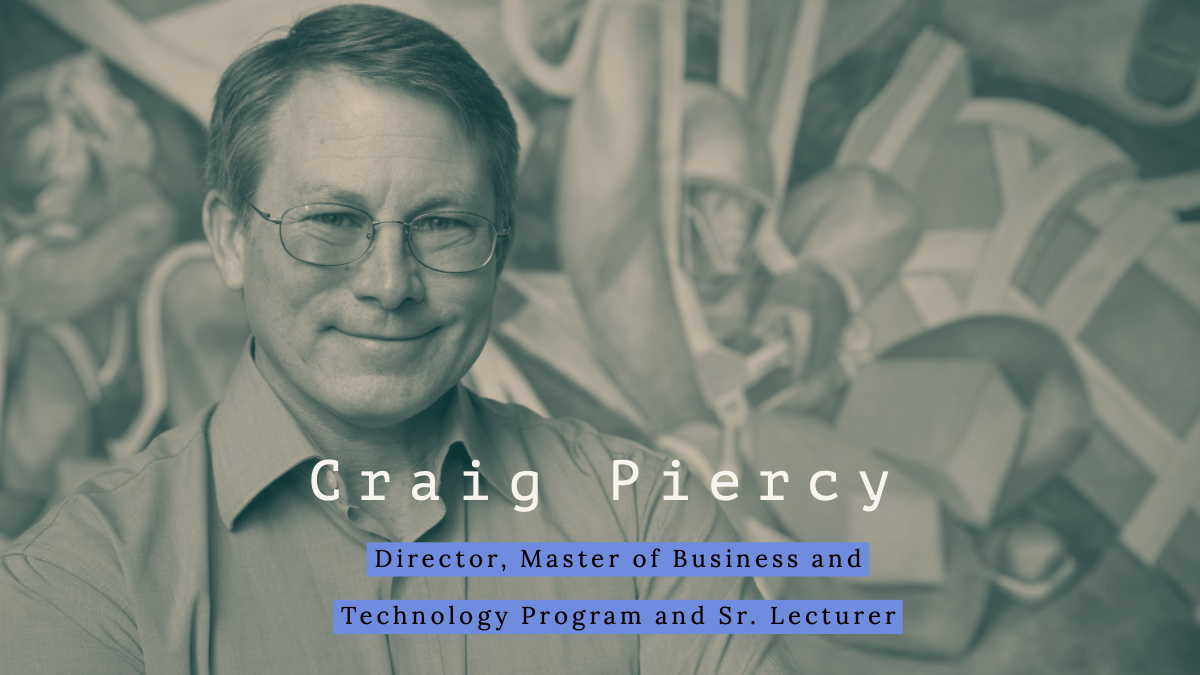JOUR 3190 | Profile

Ten minutes prior to his Network Application Development class, Craig Piercy stands at the front of a large lecture hall, eyes scanning several round tables scattered with students. He’s eager for discussion. Piercy quickly finds an opportunity when he spots a student typing on her laptop, a black guide dog laying under her table. He makes polite conversation with her before turning his attention to the dog, crouching down and taking note of how bored he seems. “We need to get a keyboard that works with dog paws, don’t we buddy?” says Piercy. He hypothesizes that students must put off “bored pheromones” that dogs can sense.
When a techno-sounding alarm signals the start of class, Piercy begins a quick explanation of HTML tags before letting students work on their JavaScript projects. He moves swiftly around the room for the rest of class as students call his name from every direction. He sits next to each student, fidgeting on their computers and thoroughly explaining solutions to their coding problems.
Piercy’s former student, Tessa McCorkle, is no stranger to his patient nature. “Piercy is one of the most compassionate and supportive professors and individuals I’ve met during my time at UGA,” says McCorkle. “There were plenty of times that I had no idea what to do in a situation, both personal and course-related, and Doctor Piercy was always willing to help me sort everything out.” She recalls that his “mountain man vibe” instantly reminded her of family.
Piercy’s willingness to help students, along with his expertise, exemplifies his passion for teaching programming. Piercy says he “got the bug for teaching” when he saw the lifestyle of professors and got to teach courses while getting his MBA in Business Administration and Ph.D. in Management Sciences at UGA.
As for deciding to teach MIS, Piercy says it “wasn’t totally a conscious choice.” After graduating with a degree in electrical engineering, he worked at Towson University in Towson, Maryland, from 1997 to 2000, helping start its Computing Information Systems program. He says this brought him closer to MIS. Shortly after the MIS department was created at UGA in the late 90s, one of Piercy’s mentors and professors, who was also the chair of the department, told him about a teaching opportunity there, which he took in 2000.
Nineteen years later, Piercy currently teaches technical courses. At the undergrad level, that would include his Network Application Development class. He also teaches courses for the Master of Business and Technology at the Terry College of Business, including an advanced topics course and the program’s first course, Digital Business Technology.
Piercy says his approach to teaching is to figure out what level an audience is at and then break down a complex topic so they can understand it. Piercy says he tries to make learning more experiential by using a “flipped” classroom model for undergraduate courses, meaning students work on activities more often than he talks. This includes posting YouTube videos for students to watch before completing their coding work. Piercy also emphasizes student support. He says he’s “getting to know them well, trying to understand them as individuals and supporting them with their particular progress and their issues that they have at learning.”
Piercy says he treats students “not exactly like I do my kids, but to some extent it’s similar in that at times I want to be nice and friendly, but at other times it’s in their best interest to provide some discipline, and to give them structure.” A story from Tessa McCorkle exemplifies the bond Piercy forms with his students. She says that one day, Piercy was playing country music during a lecture and noticed her humming to the songs. “Tessa we’re going to have to go to karaoke, aren’t we?” said Piercy. Later in the semester, Piercy came to class with a playlist of country songs featuring the three aspects that McCorkle told him every country song needs: a tractor, a dog or your wife leaving you.
Another student of Piercy’s, Surada Sriboonruang, says, “He always says ‘hi’ to me whenever he sees me. He always jokes and asks questions about how I am doing.” Sriboonruang says this inspired her to be kind to others and try her best to help them whenever she can.
The students, however, aren’t the only ones benefiting from their relationships with Piercy. Piercy says it feels rewarding when he’s helping a struggling student with a concept and eventually sees them start to understand. “When I see the light go on in their face, it’s like that dopamine rush when you’re playing a stupid game on iPhone,” says Piercy. “You feel good about it. That kinda makes you stay addicted to teaching when you see those lightbulbs go off a lot.”
Along with being a professor, Piercy is also the Director of the Master of Business and Technology (MBT) at the Terry College of Business. As the director, Piercy has many different roles, including evaluating applications, improving the program rankings and working on accreditation.
Piercy said he thinks the program is good for students who want to level up their career by improving the skills they have, or by gaining new ones. He says that the program “has become dear to me” because he’s been so successful at evolving it over the years, especially in moving the program fully online.
Piercy says teaching online provides him and online students flexibility of scheduling and location. He says that if you keep good communication with online students, you get to know them almost as well as students in a traditional classroom. The preparation and communication involved in online classes and the lack of nonverbal cues are both disadvantages, though, according to Piercy. Although, he says, technology is getting better, and with one-on-one video calls, “it’s almost like they’re in the same room.”
As for the future of the online master’s program, Piercy says he wants to continue its current “slow-growth-mode,” but doesn’t want to move to much more than 40 students. Currently, he’s devoting his time to improving the curriculum and the rankings while maintaining the current quality of the program.
Although much of his time is focused on work, Piercy is also very involved with the Boy Scouts through his sons, Nicolas, 20, and Victor, 11. He has been an adult leader for 15 years. “That’s been both rewarding in many ways, not only with watching my sons grow and mature, but helping other people’s sons grow and mature and learn good values through the scouting system,” says Piercy.
Piercy labels himself a “family man,” with his main interests being “my wife and my boys.” Piercy has always loved outdoor activities like white water kayaking, but says “now I’m too old and out of shape to do that so much,” and sticks to paddling.
When he’s not outdoors, Piercy reads science fiction and fantasy books. “I’m one of those geeks who has read all the books of ‘Game of Thrones’ but haven’t watched the show,” says Piercy. He also says he likes to “tinker with electronics and kits and robotics” when he can.
As for the future, Piercy says he’s “pretty content with my career as it is now,” but says he might move into a more administrative role or do some outside consulting. “If I continue to do what I’m doing now with UGA, and maybe add a few consulting gigs…maybe write another textbook or two, I’ll probably be pretty happy,” says Piercy.
Interviewees: Craig Piercy, Tessa McCorkle & Surada Sriboonruang
Background sources:
https://online.uga.edu/faculty/craig-piercyhttps://www.terry.uga.edu/news/spotlights/business-education-boldly-goes-onlinehttps://www.terry.uga.edu/directory/mis/craig-allan-piercy
JOUR 3190 | Preview and Event Coverage
Preview Women In Technology Hosts Annual App Day Event
Women In Technology’s annual App Day event, which aims to teach kids from Clarke County schools basic technical skills, will take place in the University of Georgia’s Tate Grand Hall on Thursday, Feb. 21, from 9:30 a.m. to 12:30 p.m.
Sixty students from surrounding schools, such as Clarke Central and Cedar Shoals, will learn about app development through workshops taught by professors in the Department of Management and Information Systems at UGA. The students will be using virtual academy Microsoft TouchDevelop on tablets to demonstrate the skills that they learn.
Along with Women in Technology, State Farm is also sponsoring the event, and will have a representative give a presentation on software development and working in a technical environment.“ By the end of the workshop, they will have built an app in TouchDevelop, and kind of understood some of the background information about it,” says president of Women in Technology, Dalia Aly.
Aly says that she wants to expose the students to a new side of the tech industry, and hopes to “give them the tools to maybe spark part of their imagination to look into further after this event.”Aly hopes that App Day will become a bigger event in the future, because she says it is “really one of my favorite events that we do.”
For information about volunteering for App Day, visit Women in Technology’s website http://womenintechuga.wixsite.com/womenintechuga.
Interviewee: Dalia Aly
Background Sources:
http://womenintechuga.wixsite.com/womenintechuga/app-dayhttps://www.touchdevelop.com/docs/app-day
Event Coverage Women in Technology and State Farm Welcome Clarke County Students to App Day Event
On Thursday, Feb. 21, 60 students from Clarke County schools arrived at the University of Georgia’s Tate Reception Hall to participate in App Day, a software learning event sponsored by Women in Technology and State Farm.
The students listened as members of the Department of Management Information Systems and State Farm talked about careers in the technological field and their experiences working in information technology.
MIS director and lecturer, Craig Allan Piercy, instructed students to pull up Microsoft TouchDevelop, a tool that gives step-by-step instructions on how to create apps, on a mobile device. Volunteers circulated the room to assist students with any questions throughout the workshop.
President of Women in Technology, Dalia Aly, said that she wants students to walk away from the event having asked either a volunteer or an officer about the MIS or Computer Science majors. Aly also hopes that this event will “spark a new curiosity” in students, and encourage them to “dig deeper” into the technological field.
“We don’t have enough graduates right now,” said MIS department head Marie-Claude Boudreau. She said that because of these low numbers, MIS students are often able to secure amazing job opportunities with good starting salaries prior to graduation. Boudreau encouraged the Clarke County students to either combine MIS with their other degrees or to double major.
Michael Bosby, a film technology teacher who attended App Day, is also encouraging students to explore the technical field. “I wanted my students to come in and get an idea of how to build an app, and how what they’re doing as far as film technology, coincides with technology, period,” says Bosby.
Bosby said that events like App Day can positively affect his students. He realized this after seeing how much his students enjoyed visiting the Games and Virtual Environments Lab at UGA weeks prior. The students left the event with a State Farm gift bag, the app they created, and more information about what the world of technology can offer them in the future.
Interviewees: Dalia Aly, Marie-Claude Boudreau & Michael Bosby
Sources:
https://www.facebook.com/WomenInTechUGA/?epa=SEARCH_BOXhttps://www.terry.uga.edu/academics/offices/management-information-systemshttps://uga.campuslabs.com/engage/organization/WomenInTechUGA?query=women%20in%20tech
JOUR 3190 | Trend Article
Examination of Trends in the Number of Management Information Systems Majors at the University of Georgia
The number of students majoring in Management Information Systems (MIS) has grown exponentially over the past few years. The major was unranked in 2012 but leapt to ninth position in 2018 on the list of most popular majors, according to the UGA Fact Book.
The MIS major first appeared on the list in 2013 at number 28 with 318 undergraduate students in the program and it remained at 28 through 2015. In 2016, MIS experienced a burst in popularity when it jumped to number 12 with 540 undergraduates.
MIS Department Head, Marie-Claude Boudreau, said that as a whole, the nation followed the same trend experienced at UGA. Boudreau said that in the early 2000s, MIS departments suffered low enrollment all over the country because of the “internet bust” and fear that computer related jobs would be outsourced.
“At that point there was not enough demand, so that called for higher salaries for the few graduates that we had, and then that had the virtuous circle in terms of attracting more students,” said Boudreau.
UGA student and MIS major Jessy Eldell said that he feels the increased number of students majoring in MIS is in direct response to the growing need for protection from cybersecurity threats as well as business demand from companies like the PWC and Ernst & Young. Eldell also said that this increase has to do with society’s dependence on IoTs like smart houses and smartphones.
“You see this increase in, like, consumer demand for these types of products, as a result businesses have an increased demand for people in that field leading to people that want a job wanting to move into those fields and learn,” said Eldell.
According to the College Majors Handbook, nine out of 10 students graduating with an MIS bachelor’s degree are responsible for activities involving computer applications, programming and systems development. The most popular job for bachelor’s graduates being Computer Systems Analysis.
The Handbook also said that the outlook for MIS graduates is very good. Between the years of 2008 and 2018, the book estimated employment of computer systems analysts, computer software engineers and network and computer systems administrators to increase much faster than the average for all occupations.
As for the upcoming years, UGA MIS major Kate Coriell says that she thinks enrollment in MIS will “continue increasing, especially if the departments continue to grow, and eventually I think it’ll hit a point where it kind of plateaus a little bit, but for the foreseeable future I just see it increasing a good bit.”
Interviews: Jessy Eldell, Kate Coriell & Marie-Claude Boudreau
Background Sources:
UGA Fact Book- Popular Majors https://oir.uga.edu/factbook/enrollment/S04EnrP30/College Majors Handbooks-
UGA Libraries PDF Chapter 60http://eds.a.ebscohost.com/eds/detail/detail?vid=1&sid=8348fb12-faa2-4e31-a9bd-eec4e86c0a3f%40sdc-v-sessmgr04&bdata=JnNpdGU9ZWRzLWxpdmU%3d#AN=466876&db=e900xww

